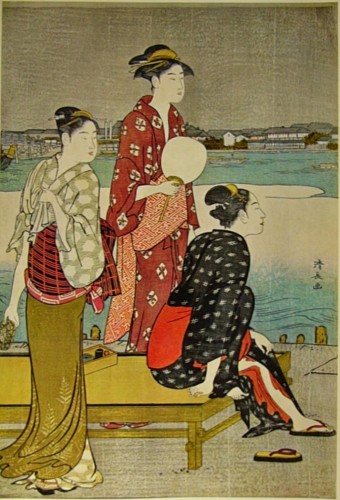
Kiyonaga Riverside Ukiyo-e
The phrase iki is generally used in Japanese culture to describe qualities that are aesthetically appealing and when applied to a person, what they do, or have, constitutes a high compliment.
Iki is not found in nature. While similar to wabi-sabi in that it disregards perfection, iki is a broad term that encompasses various characteristics related to refinement with flair.
The tasteful manifestation of sensuality can be iki.
Etymologically, iki has a root that means pure and unadulterated. However, it also carries a connotation of having an appetite for life. Iki is never cute.
The basis of iki is thought to have formed among urbane commoners (chonin) in Edo in the Tokugawa period (1603 to 1868). Iki is sometimes misunderstood as simply “anything Japanese”, but it is actually a specific aesthetic ideal, distinct from more ethereal notions of transcendence or poverty. As such, samuri, for example, would typically, as a class, be considered devoid of iki, (see yabo).
At the same time, individualistic warriors are often depicted in contemporary popular imagination as embodying the iki ideals of a clear, stylish manner and blunt, unwavering directness. The term became widespread in modern intellectual circles through the book The Structure of “Iki” (1930) by Kuki Sukuzo.
adapted from wikipedia.org

Digital Zen Timers, a mindfulness practice tool
Now & Zen
1638 Pearl Street
Boulder, CO 80302
Posted in Bamboo Chime Clocks, Beauty, Meditation Tools, mindfulness practice, Natural Awakening, Now & Zen Alarm Clocks, Progressive Awakening, wabi-sabi, Yoga Timer, Zen Timers